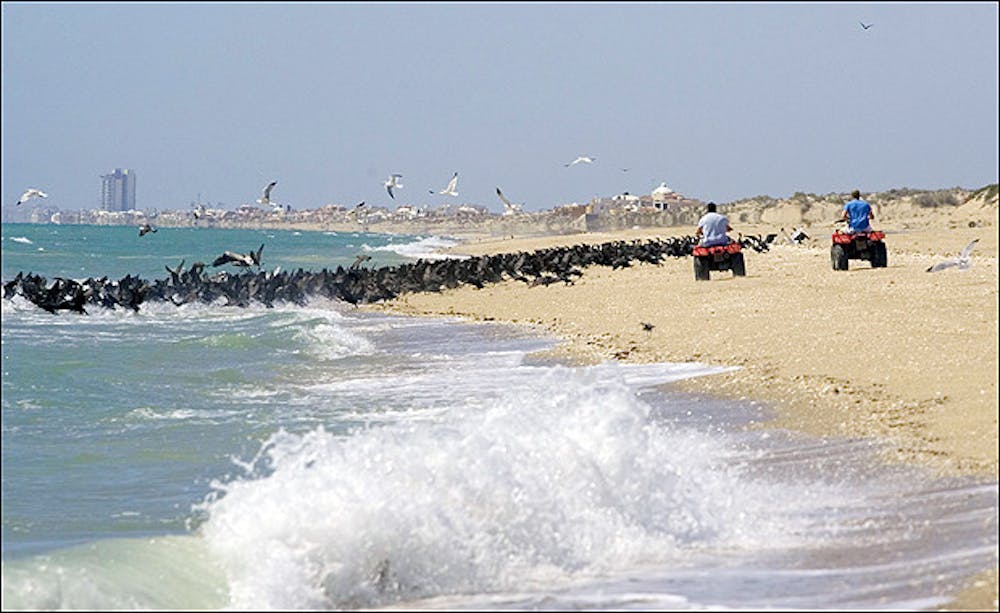Amid reports and warnings of growing danger across Mexico, many ASU students canceled their spring-break vacations south of the border, and popular beach destination Rocky Point has already seen the tourism dollars decline.
Despite these reports, hundreds of students still visited the city last week and few, if any, experienced problems related to drug-cartel violence.
Tom Sorrell, a kinesiology sophomore, spent several days in Rocky Point, or Puerto Peñasco, in a rented house near the beach.
“I didn’t encounter anything dangerous, other than drunk people from Arizona,” he said.
Though there have been reports of violence penetrating tourist cities, tourism officials in Rocky Point said the city remains safe despite turmoil in nearby border towns.
Sorrell, who traveled with several other ASU students including justice studies sophomore Zach Strumpf, said he never felt unsafe during the trip.
Strumpf said though it was his first time in Rocky Point, he didn’t have any insecurities about the drug cartels.
“I didn’t feel unsafe any more than being on Mill [Avenue] on a Saturday late at night,” he said. “The only thing to be scared of was drunk college students.”
Sorrell said the group saw armed troops driving through the downtown area of the city about once a day during their four-day vacation.
Mexico’s Tourism Minister Rodolfo Elizondo reprimanded the media — largely American — last month while visiting Cancún, saying the heavy focus on crime is damaging the nation’s image.
Rafael González, director of the Rocky Point Convention and Visitors Bureau, said negative press has strongly affected tourism in the city.
“We had close to 1,000 hotel and condominium cancellations over the last couple of weekends,” González said. “All of the college presidents are telling students not to go [to Rocky Point], and it’s a big misunderstanding.”
ASU officials encouraged students to read the U.S. Department of State travel alert for Mexico — updated on Feb. 20 — before traveling. The UA assistant vice president and dean of students issued a memo strongly advising students to avoid all spring-break travel in Mexico.
González said while the violence is spreading further south from border towns like Tijuana and Nogales, it hasn’t penetrated Rocky Point.
“We have been the No. 1 destination for Arizona college spring breakers for the last 21 years, but last week things weren’t normal,” González said.
Though his office won’t have the actual tourist count until later in the spring-break season, González said the numbers are down from last year.
Global studies and Spanish senior Callie Switzer spent spring break in Mexico City, recently deemed the kidnapping capital of the world.
Switzer traveled with another ASU student and stayed with a friend in Mexico City.
“I wasn’t concerned at all about safety,” Switzer said, adding that she briefly read through the travel alert before her trip. “I’ve been all over Mexico in the past.”
Switzer said she didn’t see anything out of the ordinary during the trip, but traveled with her friend from the city the entire time.
“There was one point [when] we were riding the subway at 11 p.m. and we got to a stop, and my friend was like, ‘Yeah, this is the most dangerous part of the city, and we’re not getting off,’” Switzer said.
Traveling with a friend who knew the area well made all the difference, she said.
“[The violence] has been so publicized that it’s almost like an old hat now,” she said. “Based on what I saw here, it’s hard to believe that it’s going on, but it is.”
Though Switzer said she hasn’t doubted the extreme violence reported by American media, there were no indicators of problems in the areas of Mexico City she visited.
“I know I was in a sheltered environment, but I don’t know if [the violence is] really on such a grand scale.”
Reach the reporter at tessa.muggeridge@asu.edu.




